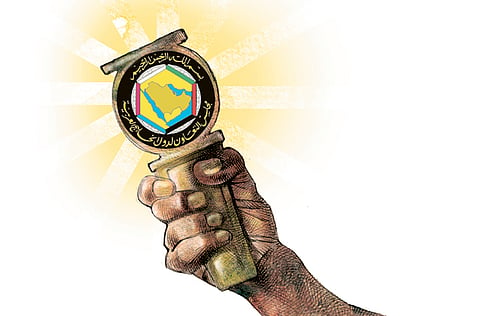Effective leader of Arab world
It is important that the GCC guides countries emerging from decades of state control

The Gulf Cooperation Council (GCC) is the only Arab body offering the Arab world effective political leadership at present. The traditional leaders all have their own problems: Egypt is unable to offer a coherent programme as it struggles with the effects of its uprising and prepares for elections in September; Syria is totally focused on its internal affairs as the protests and marches spread; Iraq is struggling to keep its coalition together.
The GCC states have the advantage of relative political stability, even if Bahrain is going through its own troubles. And they have a coherent strategic position on where the Arab world should stand in international affairs, as they all support global multilateral systems, based on mutual respect and cooperation, and are firmly in favour of taking part in the global, open-market, competitive economies.
It is important that the GCC continues to spell out its vision over the next few months, and by doing so is able to act as a guide for those countries that are looking for a way forward after emerging from decades of state control and stagnant governance.
It would be easy for them to make some dramatically wrong choices: For example, it would be a tragedy if a new government in Egypt decided to impose even more protectionist policies than it has at the moment in order to isolate struggling Egyptian companies from the pressures of the outside world.
It would be a disaster if Tunisia, or even a new Libya, rejected the existing international consensus in favour of a more radically Islamic view of international affairs.
Such long-term thinking gives a sensible framework for the short-term tactical work the GCC has been doing to great effect. The GCC led the way on Libya ever since it approved the idea of a no fly-zone long before the Arab League or the United Nations had got that far.
The GCC has also been the framework through which Bahrain has gathered regional support as the government has struggled to deal with protesters.
And now it seems that the GCC is about to get involved in mediating in Yemen, with the intention of easing President Ali Abdullah Saleh out of power while ensuring that the country does not descend into chaos.
Within the GCC, the UAE and Qatar have emerged as the two countries offering political leadership. They are the countries which shape policy on a day-to-day basis, and it is these two which demonstrated their commitment by sending forces for the Libya operation.
Bahrain and Oman are unable to offer much due to temperament and their need to deal with internal problems. Kuwait certainly has enough debate to offer the region bright ideas, but the turmoil in its own parliamentary politics has disabled it from taking a regional role. Saudi Arabia is the largest country in the GCC, and could easily become a regional leader, but at present it is not willing to do so, other than to concentrate on how its forces are supporting the government in Bahrain, and to insist on building a strong GCC position against Iran.
Iran factor
This was a key issue at this week's extraordinary meeting of GCC Foreign Ministers, which took a very tough line on Iran. UAE Foreign Minister Shaikh Abdullah Bin Zayed Al Nahyan chaired the meeting, which condemned "Iran's ongoing interference in the GCC countries' internal affairs by conspiring against their national security and sowing communal sedition among their citizens, in violation of these countries' sovereignty, independence, and principle of good neighbourliness, international laws and conventions and the UN and OIC charters".
This hardening of the GCC line against Iran after some years of gently improving relations has been triggered by two immediate events. The GCC wanted to be very clear that Iran realises that it should not interfere in Bahrain in support of the Shiite opposition parties, which is why the GCC foreign ministers welcomed the return to calm in Bahrain and reiterated legitimacy of the Peninsula Shield forces' presence there.
The second event was the discovery of an Iranian spy operation in Kuwait which infuriated the six GCC nations. A Kuwaiti court last week gave its verdicts against a Kuwaiti and Iranians for involvement in spying and setting up sleeper cells in Kuwait, which then led to Kuwait recalling its ambassador and expelling three Iranian diplomats.
The GCC foreign ministers denounced Iran's flagrant interference in the internal affairs of Kuwait by planting espionage networks in its territories and attempting to undermine its security, stability and interests of its citizens.
The GCC ministers also voiced their concern over developments in Yemen and deteriorating security there, and urged all concerned parties in Yemen to consider national interest and to resort to national dialogue in order to reach a comprehensive deal that would help regain peace and achieve the aspirations of Yemeni people for reform and decent living.
Part of the new leadership being offered by the GCC is that this plea for good sense has been backed by action. The GCC is expected to send a senior official to Yemen to talk to both the government and opposition, and find a way forward to a "constructive national dialogue". The GCC cannot afford to see Yemen sink into chaos, and is likely to bring substantial pressure to bear on Saleh to leave office allowing a new government to take over.



